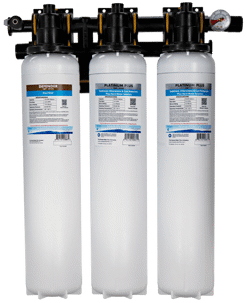If you live in Colorado—especially around Denver—you probably already know we have beautiful mountains, 300 days of sunshine, and some of the hardest water in the country.
But what most people don’t realize is just how much this hard water impacts our homes, our skin, and our wallets over time.
Let’s break it down in plain language.
🧂 What is Hard Water Anyway?
Hard water simply means your water has high levels of minerals like calcium and magnesium.
It’s not necessarily dangerous to drink in moderate amounts. But it causes big problems:
It clogs pipes and water heaters with scale.
It leaves chalky residue on dishes, faucets, and shower glass.
It makes soaps and shampoos way less effective.
It can dry out your skin and hair every time you shower.
The higher the mineral content, the “harder” your water is.
🏠 What Does This Mean For Your Home?
Here in the Denver metro area, water hardness usually ranges from 120–180 mg/L, which is considered hard to very hard. (Denver Water Quality Reports)
Here’s what happens when you have hard water:
✅ Scale builds up inside your water heater.
Over time, this can shorten its life by 2–4 years and make it less efficient (meaning higher energy bills).
✅ Dishwashers and washing machines wear out faster.
Hard water can reduce appliance lifespan by 20–30%.
✅ Plumbing gets restricted.
As scale collects inside pipes, it narrows the openings—lowering water pressure and increasing the chance of leaks.
✅ Fixtures get covered in crusty residue.
Even if you scrub, it just keeps coming back.
🧒 What About Health and Skin?
If you or your kids have sensitive skin, eczema, or psoriasis, hard water can make things worse.
A study from the University of Nottingham found that children in hard water areas were 50% more likely to develop eczema.
(Source: Hard Water and Atopic Dermatitis in Children, 2017)
It’s not just a minor annoyance—it can be an everyday discomfort.
And let’s be honest: no one wants to feel like they need a lotion bath after every shower.
🐶 Don’t Forget About Your Pets
Pets are part of the family, too.
If your dog or cat has dry, flaky skin or dull fur, hard water might be part of the problem.
When you wash your pets with hard water, it’s harder to rinse away shampoo, and the leftover minerals can irritate their skin.
🗺️ Colorado’s Hard Water Hotspots
Wondering if your ZIP code is affected?
Here’s a water hardness map from the Water Quality Association:
Most of Colorado—especially the Front Range—is in the hard to very hard zone.

Image courtesy of WQA
🛠️ What Can You Do About It?
There are a few options:
✔️ Use water softeners. These remove calcium and magnesium to reduce scaling (not recommended by Master Plumbers.)
✔️ Install a whole-home water filtration system. Systems like Honest Water not only handle minerals but also remove chlorine, chloramines, and other contaminants.
✔️ Install point-of-use filters on taps you drink from, but remember—those won’t protect your pipes or your showers.
✅ Why Whole-Home Filtration Makes Sense
When you treat all the water coming into your house:
Your skin feels better.
Your appliances last longer.
Your pipes stay cleaner.
You save money on cleaning supplies and maintenance.
Your whole family (including pets!) enjoys healthier water.
If you’re curious how hard your water is, or if you’d like help understanding your options, we’re always here to answer questions—no pressure, just good information.
Stay well and take care of your water (and yourself),
—Barbara
References:

